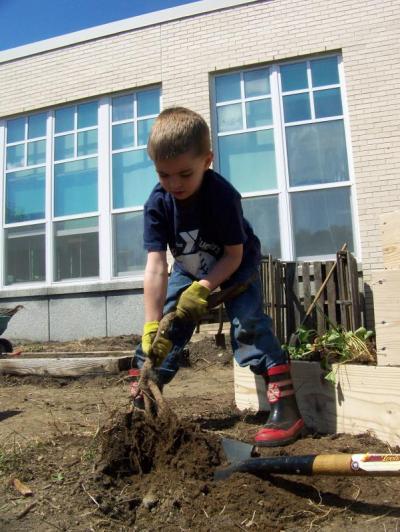Here we grow again
Three new blueberry bushes, a few rebuilt garden beds, two compost bins, and two donated picnic tables are some recent improvements at the Sippican School Community Garden. School staff and residents recently gathered to spruce it up for spring.
The garden has been used as an outdoor classroom since 2005, but received a significant makeover on Saturday, April 27, thanks to volunteer efforts.
Rotting wooden garden beds were replaced with fresh ones built of native pine untreated by chemicals. Before Saturday, Marion department of public works employees prepared the soil, which had been heavily matted with weeds. Two fruit trees – one was damaged, one didn’t bear fruit – were removed from the garden area.
The Marion Tree and Parks Committee donated new trees, to be planted in the field adjacent to the site.
“[The garden] is just going to be beautiful,” said Garden Coordinator Diane Cook. “Nothing gives me more pleasure than seeing someone that age, or that age there, marvel at what’s growing,” Cook said, pointing to young volunteers using kid-sized tools.
Cook, a retired Sippican School teacher, stepped in to keep the garden growing when she realized administrators and staff lacked the time and resources to maintain it.
According to Cook, the garden offers “out of classroom learning” through a variety of lessons on insects, plants, worms, soil composition, and other topics.
She is one of three educators who tied the school’s curriculum to the garden eight years ago.
Throughout the growing season, 15 students participate in the garden club during three sessions held spring, summer, and fall. The community garden can be found behind the school, on the building’s western side.
Tending the garden to make it fertile ground is a huge task, Cook said. She noted the local soil profile (a measure of fertility) is ranked among the worst nationally. Amending the soil by adding a mixture of compost, minerals, and loam becomes very important she said.
Everything in the garden – from apple trees to zucchinis – are possible through donations of time and materials. Cook, together with Sippican School music teacher Hannah Moore, seeks donations from area businesses to keep the garden well stocked. Its success is entirely dependent on volunteers, as it receives no funds from the school or town, Cook said.
She used “The Giant Turnip,” a fairly tale, to describe those involved with the garden. In the story, people and animals join together one-by-one to yank it out. It’s only when a mouse joins everyone else that the turnip is removed.
“This garden is about community. That’s the moral of the story,” Cook said.















